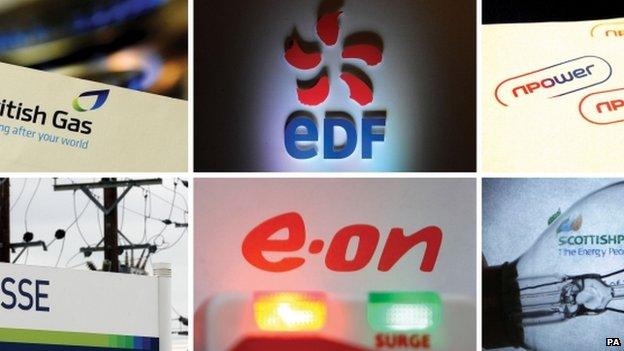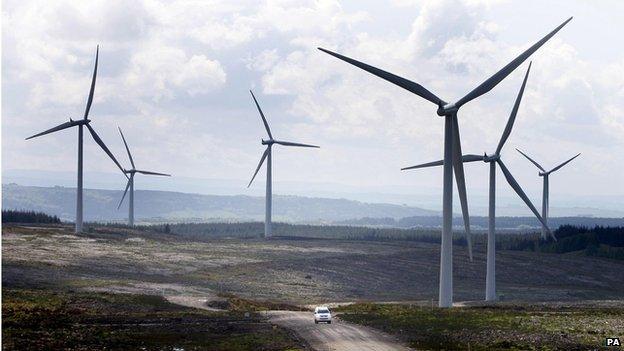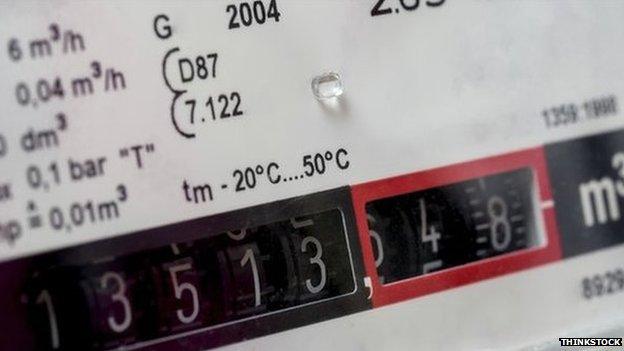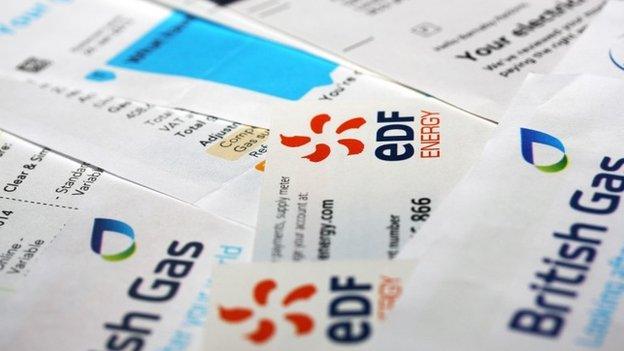Energy markets: switched off
- Published

Energy companies are down there with banks at the bottom of the public's league table for love and affection. (Yes, and journalists too.)
So it fits the public and political narrative to pick up on the headline finding of the Competition and Markets Authority (CMA) review of the energy market - that we've been overcharged to the tune of £1.2bn a year.
Clearly, Something Must Be Done. We'll hear later this year from the CMA as to what it thinks that should be.
What that headline figure can miss is that small and medium-sized enterprises (SMEs) are getting relatively harder hit by high prices. They're over-paying by around £500m per year, with a wider margin that that on the domestic customer.
It is, as you might expect, a bit more complicated than that. Not all companies have been making such profits. One of the Big Six was making consistent losses through the years in question, apparently due its own inefficiency.
For all the complex analysis by the CMA, the over-payment measure was based on quite a simple measure of the return on capital employed. During the years in question, capital has been very cheap, and so the return has looked over-generous.
It's worth noting what the CMA did not find. It didn't find that energy companies have been using their market power unfairly to fix the wholesale markets. Nor has the use of vertical integration - pumping the gas out of the seabed, as well as distributing it and selling it to the customer - given the Big Six an unduly unfair advantage.
Uncomfortable read
So some of the common attacks on the energy firms may have to be modified.
And if you read more closely into the CMA report, you find its attacks are spread more widely than the headlines might suggest.
The sector regulator Ofgem, for instance, will be finding this report an uncomfortable read. Responding to the perception of over-complexity, it forced the Big Six to cut down their extensive range of tariffs into no more than four at any one time.
The CMA finds that is not good for the customer, and not good for market innovation. It likes market innovation.
Lack of transparency
The report looks at the relationship between Ofgem and the Department of Energy (DECC) and Climate Change in Whitehall, and doesn't like what it sees.
That's because it can't see much. The relationship lacks transparency. Ofgem feels it has been pressured by government to shift its focus to priorities other than promoting competition between energy companies. But it's not clear how this pressure was brought to bear.
The CMA proposes a much more transparent relationship between government and regulator, in which ministers make clear what they want the regulator to do, and the regulator has to make clear what it thinks is not in the interests of the customer or wider industry.
DECC also gets a dressing down for the way it went about reforming the subsidy of renewable energy. It's moving to a system for Contracts for Difference - a guaranteed floor price per unit. In most cases, this involves competitive bidding to provide power at the lowest subsidy.

Different technologies get different tranches of subsidy. But the CMA points out there is no evidence to show how or why the different pots of funding are allocated. (Perhaps it had something to do with a political will to put the brakes on onshore wind turbines.)
It also points out that DECC chose to avoid competition in allocating some of its subsidy to offshore wind power. The result is calculated at a very significant £250m to £310m extra on bills for 15 years of the contract. That decision alone adds 1% to your domestic bill, says the CMA.
Reading the meter
But perhaps the 'stakeholder' (if I'm allowed to use that word) who should feel most ashamed of the outcome of this CMA report is you, the customer.
You and I have a role to play in making the market work. And frankly, we're not playing our part.

In a survey of 7000 customers, the CMA review found 36% did not know they could change supplier or tariff.
Slightly less than that have never considered switching. And 56% had not switched supplier, didn't know they could or didn't know if they had, over the preceding three years. That was true of 72% when asked about changing tariff.
Those most reluctant to switch tend to be on lower incomes. Of those with household income below £18,000, 20% had switched in the preceding three years, whereas 35% had switched among those on more than £36,000 per year. There's a similar correlation with qualification levels.
So those with most to gain from switching, at least relative to their income, are the least likely to do so.
Scots brand loyalty
Scotland is unusually averse to switching. Some 29% of Scottish and Welsh customers have been with their supplier for at least 10 years, compared with 21% in England.
In Scotland, they found 65% were with an incumbent supplier (the one they had inherited), compared with 53% in England.

Those who face a particularly big bills, with Dynamic Teleswitched electricity meters - providing heating where there's no gas supply in north and south Scotland - are among the worst offenders at not switching.
Perhaps it's because the dominant brands are rather more familiar and Scottish than others.
The evidence shows Scots have more customer satisfaction with their providers. They also have no experience of engaging with rival water utility companies, as others do in Britain.
Whatever the reason, the CMA wants to prod us, the customers, into activity. You might think they should unleash the companies to sell their wares door-to-door - if only the mis-selling from doing so hadn't just brought an end to the practice.
No, if the energy firms are to be tamed, we're going to have to do our patriotic duty, to engage and to get switching.
- Published2 July 2015
